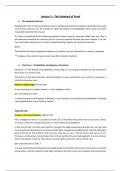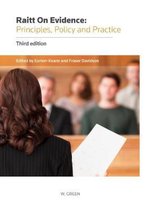Lecture notes
Law of Evidence - Lecture 5 - The Standard of Proof
- Module
- Law of Evidence (LAW09122)
- Institution
- Edinburgh Napier University (ENU)
- Book
- Raitt on Evidence
Lecture notes for the Law of Evidence module linked to Raitt on Evidence. Author achieved a first-class grade for the module.
[Show more]




